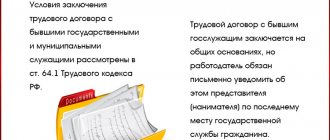William Poundstone: “Hiring a bad employee does more harm to a firm than not hiring a good one.”
Every business leader needs financial success. And it mainly depends on the human factor. The key to the successful operation of any company is its good staff. People are the most important resource and the main component of success in a company, allowing it to be stable, successful and competitive. Safety, fulfillment of production tasks, and the psychological climate in the team depend on people. Personnel play a major role in the survival of any company in the market.
But in addition to high qualifications, the loyalty, reliability, honesty and decency of its staff also comes first. There will be a good result only if the position has a loyal employee corresponding to it. The employer is the main person interested in the prosperity of his business and in decent employees who will not embezzle from him or have bad habits that prevent them from working.
Problems in a company do not begin when plans are thwarted, money or goods are stolen, orders and customers are secretly transferred past the cash register to competitors, theft and sabotage occur, valuable personnel are fired, but they are formed much earlier, at the moment when disloyal ones were hired People.
Selecting honest, loyal, reliable employees is the most important task for any manager. It is difficult to find a worthy person for a vacancy. Conscientious and good employees are held on to, they are valued, and they are always the last to be fired from the company. They rarely look for a new place. The first to be fired from previous positions are always: embezzlers, haulers, alcoholics, drug addicts, criminals, lazy people, truants, scandal-mongers, etc. These careless workers then try again to get a new job. And the leader who gets them will be very unlucky. And the cost of making a mistake when choosing an unworthy candidate is very high. By hiring the “wrong” person, the employer risks destroying his business, which he has been building for years. Unsuccessful and sometimes illiterate selection of personnel leads to significant financial losses and large losses. A fatal mistake is not easy to correct; sometimes the owner has to start all over again, relying on harsh previous experience.
When hiring a newcomer for a vacancy, it is difficult to determine his negative actions in previous places, especially since the candidate himself will never say anything bad about himself. It is even more difficult to determine who the applicant actually is: a decent person, a fraudster, or a sent “scout” from competitors. Cheating on the part of job seekers during their employment has become so common that it is considered the norm among them.
How to find good, honest and loyal employees? In what ways can this be done? We need some kind of “filter” that could let through the worthy and weed out the disloyal. Traditional recruitment methods only partially solve this problem. When applying for a job, the polygraph has established itself as one of the effective tools for ensuring personnel security, due to its information content, reliability and cost-effectiveness.
More details here: Employee verification. Personnel selection.
Is it legal to use a polygraph as an adjunct to an interview?
The law of the Russian Federation contains no provisions prohibiting the use of the device when applying for a job. But a person cannot be forced to participate in an event. A person undergoes a polygraph solely voluntarily. The applicant for the position must provide his written consent to the procedure. However, in some cases, testing is not recommended. Consider these cases:
- Exhaustion of the person being tested.
- Incapacity.
- Presence of heart or respiratory diseases.
- Temporarily incapacitated due to alcohol or drug use.
- Minority.
- Pregnancy.
All these cases are limitations in the use of a lie detector. There are no direct prohibitions, but it makes sense to follow these recommendations. This is due to the fact that in the presence of the listed conditions, the polygraph may give incorrect information.
IMPORTANT! Unscrupulous applicants try to avoid taking a lie detector test. Many people know about such contraindications to testing as diseases of the heart or respiratory system. Applicants, not wanting to take a polygraph, refer specifically to these diseases. In order to prevent lies, it makes sense for the employer to request certificates of the actual presence of illness.
ATTENTION! The employer has no right to force the applicant to undergo testing.
How to pass a polygraph test when applying for a job?
Firstly, a candidate who is clean before the law should not be afraid of a polygraph test. An experienced polygraph examiner will set up the device so that your emotional state does not affect the result.
Secondly, you should prepare for the test: do not drink alcohol or other drugs to relieve anxiety, you need to get a good night’s sleep and be positive.
Thirdly, before conducting the test, it is recommended to tell the polygraph examiner about the negative aspects at previous places of work and about situations in which any violations took place.
Fourthly, during a polygraph test you should not hide anything, you should not try to deceive the polygraph, since the physiological state will give away the candidate.
The main thing when passing a polygraph test is honesty, openness and calmness.
So, the employer should carefully weigh everything before conducting a polygraph test on candidates.
The advantages of using a polygraph are:
- high probability of hiring a candidate who meets the requirements of the vacancy;
- quick and accurate identification of a candidate’s involvement in illegal actions;
- prevention of illegal actions on the part of a future employee;
- guarantee of personnel security in the organization.
The screening test also has disadvantages:
- financial costs for paying for a polygraph test;
- the need to obtain consent from the candidate to conduct an audit;
- there is a risk of obtaining an inaccurate result and making the wrong decision;
- There are difficulties when conducting polygraph tests on overly impressionable and emotional candidates.
29.11.2017
Where is the polygraph used?
The polygraph can be used by both private companies and government agencies. As a rule, it is used if the position involves greater responsibility. The polygraph is often used when hiring for the following positions:
- Positions that require access to valuables (cashier, salesperson).
- Bank employees.
- Employees of the Ministry of Internal Affairs.
- Secret service workers.
- FSB officers.
The employer has the right to establish a polygraph test when appointing a person to any position.
Polygraph (lie detector) when applying for a job. Its capabilities.
When applying for a job, a polygraph allows you to effectively identify risk factors in a candidate, possibly hidden negative facts, violations or bad habits, such as:
- theft in any form at previous places (thefts, kickbacks, sales to the left, additions, fraud, embezzlement, etc.);
- the presence of “left”, fraudulent and true sources of income, the presence of parallel businesses;
- secret assignment from competitors to transmit information to them, collusion and communication with competitors;
- secret transfer of proprietary information to competitors in previous positions;
- use of official position for personal gain;
- negative actions and violations in previous places (absenteeism, drunkenness, violations of labor discipline, scandals, conflicts with colleagues, etc.);
- the true reasons and motives for dismissal from previous places;
- reasons, motives for employment, negative intentions when entering a new place;
- criminal records and criminal offences, including unsolved ones;
- bringing to criminal or administrative liability, reporting to the police;
- connections with crime, participation in organized crime groups and informal connections with them;
- abuse or addiction to alcohol or drugs;
- distortion of personal data and false information about yourself in your resume;
- forgery of provided documents, falsification of reviews and recommendations;
- gambling addiction, gambling addiction, weapons possession;
- unrepaid debts or non-repayment of loans;
- deception, envy, vindictiveness, conflict, criminal intentions towards management,
- honesty, reliability, loyalty, interest and motivation in their work, etc.
What questions are asked to the applicant?
First, the applicant for the position is asked neutral questions. They are needed to individually configure the device. Let's look at common questions:
- Information included in the resume.
- Information provided by the applicant about himself.
- History of thefts.
- Contacts with competing companies.
- Having bad habits: smoking, addiction to alcohol or drugs.
- Having a criminal record.
- Existence of debts to credit institutions.
- Compliance of the applicant's skills with the position.
- Availability of special education.
- Level of interest in work.
- Negative intentions regarding the organization.
- Having a gambling addiction.
The questionnaire is compiled individually and depends on the specific position. The list of questions should be compiled by a specialist. This is due to the fact that the questions should complement each other. Correct formulation is essential. All questions must be posed in such a way that they can be answered “yes” or “no”.
IMPORTANT! The applicant has the right to refuse to answer the question posed. Typically this involves personal or tactless questioning.
What questions are asked during a polygraph test?
Experts assure that using a polygraph you can find out any information hidden by a candidate. Working with a polygraph requires conscious responses from the candidate. Thus, the questions asked are discussed with the candidate in advance.
When drawing up questions, polygraph examiners are guided by the following rules:
- the content of the question is clear, clear, excluding double interpretation;
- the question contains vocabulary that the candidate can understand;
- the wording of the question is brief, suggesting a monosyllabic answer (“ yes
” or “
no
”); - the keywords in the question are at the end (“ Did you pass on confidential information to your competitors?
”); - the question does not contain insults or emotional concepts (“ like
” or “
love
”); - number of test questions 4-15 (no more than 20), total number – up to 100;
- any test is presented at least 2 times and no more than 4 times;
- Before voicing them on a polygraph, all questions are discussed with the candidate until they are fully understood.
During a polygraph test, three main types of questions are asked:
- neutral (used to record indicators from sensors in a candidate’s calm state);
- control tests (do not contain information about obvious offenses of the candidate, but introduce him into confusion and emotional state);
- significant, i.e. containing content about a possible offense (if the candidate tells a lie, the sensors will record emotional arousal).
Examples of significant questions:
- Have you ever taken anything worth more than 1,000 rubles from the office of the company you worked for?
- Have you ever deceived people who trusted you?
- Have you forged documents?
- Have you used your business to the detriment of your employer's business?
- Do you gamble?
- Have you conspired against your employer with other employees?
Please note that questions about personal life, political beliefs, religion and/or sexual inclinations should not be asked during a polygraph test.
Lie detector procedure
Passing the test involves a number of stages. Each of them is important, since the accuracy of the results depends on proper organization.
Introductory conversation
To pass the test, you need to allocate a special room. The main condition is the absence of noise. Only the applicant and the specialist deciphering the answers may be present in the room. The person needs to clarify the following points:
- Purpose of the inspection.
- Duration of the procedure.
- Questions that will be asked.
- Right to refuse answers.
- The right to clarify questions.
- Prohibition on certain actions (for example, moving arms and legs).
The person must fully understand the procedure.
Obtaining written consent
The applicant must obtain written consent to the procedure. Without this, the verification will not be legal.
Installation of sensors
At the moment, the polygraph is a device with a sensor. Sensors are connected to the device. The device registers various changes. The received signals are converted into code. Several measuring devices are attached to the face:
- Electrical conductivity sensors are attached to the fingers.
- On the chest and stomach there are elements that fix breathing.
- On your finger is a heart rate sensor.
The measuring devices are installed by a specialist.
Customizing the polygraph for a person
Each person has an individual reaction to their lies. For this reason, simple questions are asked first to customize the detector. Let's look at the subjects of these questions:
- Full name of the person.
- Date of Birth.
- Names of parents or other close relatives.
After this, you can ask the person all your questions. The duration of the test is 40-120 minutes.
Polygram formation
A polygram is the result of passing the test. It is transferred to the employer. The specialist must explain the results obtained. The results of decoding the answers can be summed up in 2-3 days. When deciphering the test results, the professionalism of the specialist is fundamentally important. The fact is that the answers to some questions may be ambiguous.
ATTENTION! The data obtained as a result of the verification is confidential. They cannot be disclosed.
Polygraph (lie detector) when applying for a job. With it you can:
The use of a lie detector when hiring increases the security of the enterprise, allows you to prevent negative consequences from poorly selected disloyal personnel and avoid such threats as:
- future theft, fraud and financial fraud in various forms;
- protect the enterprise from “scouts” sent by competitors, find out which of them has a task and collusion with them;
- protect yourself from the secret transfer of clients, databases, and proprietary information;
- exclude cases of receiving kickbacks, additions, and sales past the cash register;
- reduce various emergency situations in the company (binge drinking, absenteeism, violations of labor discipline, scandals, theft, embezzlement, fraud, etc.);
- exclude abuse of official position for personal gain;
- create a reliable barrier for disloyal applicants who could cause damage to the company in the future;
- select from the list of applicants the most honest and decent, corresponding in their moral qualities to the proposed vacancy;
- establish even at the verification stage negative actions and actions of the applicant that are not recorded in documents or databases;
- find and identify the presence of risk factors in the candidate that are incompatible with the position offered to him;
- significantly reduce time and material costs for personnel verification;
- predict the behavior of the applicant in the future with a high degree of probability;
- reduce the number of abuses in the company;
A polygraph when applying for a job is a good and effective means of preventing and insuring against possible negative actions and actions of disloyal employees. Of particular note is the so-called industrial espionage and theft of customers by competitors. Many companies often seek to obtain proprietary information and a client base directly from the office of a competing company that interests them. For this purpose, “sent Cossack women” are sent there for the purpose of employment. Apart from using a lie detector, they are difficult to detect in other ways.
More details here: Employee verification. Personnel selection.
Recommendations for the applicant
The applicant is advised to prepare for the test. The following recommendations exist:
- The procedure will require patience and concentration. Before passing it, it is recommended to get a good night's sleep and rest.
- Let's take light sedatives. This is necessary due to the fact that a polygraph test is a rather nerve-wracking event.
- A person must understand that he can refuse to answer a question at any time. However, it must be borne in mind that such behavior may be interpreted not in favor of the applicant.
FOR YOUR INFORMATION! The polygraph does not give 100% accurate results. For this reason, the test results are not used in court as evidence, but they may be attached to the case. The employer also needs to keep in mind that refusal to undergo testing does not always mean that the applicant is lying.
Polygraph (lie detector) when applying for a job. It reduces risks, but does not completely eliminate them.
Of course, one should not assume that using a lie detector when hiring will eliminate all problems with personnel once and for all. The use of a polygraph does not provide a 100% guarantee that the company will employ “crystal” and honest personnel. Forming a loyal team is a long, complex and multifactorial process. When working with people, there are risks always and everywhere. But if a company regularly uses a polygraph when hiring, then its chances of success increase significantly. To ensure safety, it is recommended to conduct checks not only of applicants, but also to regularly (minimum: once every six months) lie detector tests for still working personnel. Lack of control corrupts, people change and “spoil” over time.
The reliability of using a polygraph when applying for a job with good polygraph examiners reaches up to 95-99%, which is a very high figure. An ordinary applicant is defenseless against a lie detector test if a professional is working on it. The polygraph is a tool and, like any tool, it is effective only in skillful hands. Therefore, to resolve personnel issues, it makes sense to contact specialists who have extensive experience in such work.
More details here: Employee verification. Personnel selection.
PSYFACTOR+
The main problems of surveys using a polygraph
One of the main problems in this area is the insufficient influence of theoretical and practical psychology on the process of training specialists to conduct surveys using a polygraph.
Currently, the training of specialists is carried out by law enforcement agencies for their own needs, some universities on a commercial basis and private commercial organizations. After training, which lasts from 2 weeks to a year, documents of the established form are issued, depending on the number of classroom hours. The main contingent of students in this specialty are graduates of various legal and technical higher educational institutions, former employees of law enforcement agencies. By the nature and methods of activity of polygraph survey specialists, this profession is closely related to psychology. Today, training such a specialist is unthinkable without knowledge of psychology, physiology and psychophysiology. Unfortunately, the number of psychologists working in this area is extremely small and they should be more actively involved in the development of this area, since they can significantly influence the further improvement of methodology and the development of new scientific approaches.
The main criticism of the use of a modern polygraph in practice is that during the interview, characteristics and indicators of the autonomic nervous system are recorded, such as respiration, galvanic skin response, electrocardiogram, photoplethysmogram. But as is known, these indicators reflect only the emotional state of a person, and not those complex cognitive processes that are associated with receiving, storing and retrieving information about certain events in our lives and our personal experience.
Advantages of a polygraph
The main advantage of a polygraph interview is, first of all, efficiency. After a crime has occurred, it is almost impossible to carry out the entire range of operational investigative measures. It is necessary to “work” several people, i.e. to trace, listen, interrogate several times, establish a circle of acquaintances, etc., all this takes a lot of time and money, while a polygraph interview takes about 2 hours per person. Thus, in a few days it is possible to interview all suspects and cut off the bulk of people not involved in the crime.
Among the respondents, the majority are innocent people and they did not commit actions that led to the loss of money or the incident under investigation. But in the middle of them there may be people who are involved in the crime. They usually refuse to be interviewed using a polygraph. And therefore other operational-search measures are being carried out against them.
Since the specialist communicates with each suspect about the crime, additional information about the event is found out: the general picture of the incident is detailed, the degree of participation of the suspects, and the unintentionality of the actions that led to the crime is clarified. It is not uncommon for criminals to confess during an interview or “go on the run”, giving themselves away even before the interview is conducted.
How to prepare for a polygraph interview?
The main contingent of people taking polygraph surveys are innocent people. They did not commit illegal acts or crimes. They sit quietly and comply with the conditions of the survey using a polygraph.
Of course, like all normal people, there is excitement. Therefore, a specialist must have psychological skills in working with people. But unfortunately, in this profession, people mainly work from law enforcement agencies and do not have any. And they treat the polygraph as a “poacher”, as a tool for loosening the tongue of the interviewee and extracting confessions from him.
An honest man has nothing to hide. If you did not commit actions that led to the commission of a crime, then you have nothing to worry about. You do not know the details of the crime that the specialist will list. You do not know the methods and actions of criminals, and you did not commit the actions that criminals committed.
Behave correctly with a specialist; he is also a human being. Your aggressive behavior will make him increase his vigilance or, what is much worse, suspect you of a crime and reflect your inappropriate actions in his conclusion. This may indirectly or directly affect his conclusions when he decides on your innocence or guilt.
As practice shows, a survey using a polygraph today is a reliable means used in operational investigative activities, a reliable tool for preventing and combating crimes. People who talk about the uselessness of the polygraph and those who believe in its limitless possibilities are equally mistaken. Like any method, a survey using a polygraph has its advantages, disadvantages, and limits of application. There are simple thefts or crimes, and there are complex, confusing ones.
Every year in Russia approximately 50 thousand surveys are conducted using a polygraph. About half of them come from law enforcement agencies and intelligence services, and half from commercial organizations. In terms of the number of specialists working with the polygraph, our country ranks second in the world after the United States. Today in Russia there is practically no scientific development being carried out to diagnose hidden knowledge. The resulting scientific and methodological “vacuum” led to the emergence of various polygraph schools. In law enforcement agencies, not to mention commercial organizations, there is disunity and isolation, differences in the training of specialists in conducting polygraph surveys.
Best regards, Evgeniy Isaychev.









